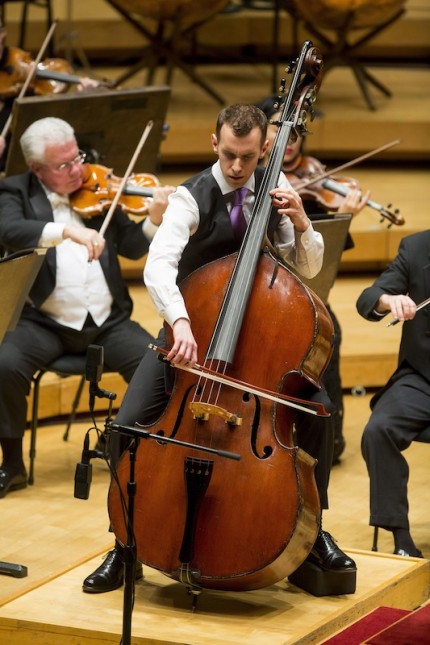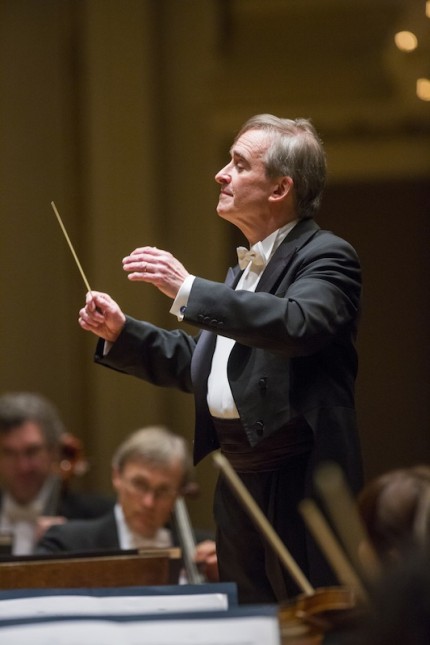Conlon wraps CSO’s year with a program of choice rarities

Four rarities were on tap for the Chicago Symphony Orchestra’s final subscription program of the year with two having their belated CSO premieres Thursday night.
It was also significant and encouraging that the program was conducted by James Conlon. With his 11-year tenure as music director of the Ravinia Festival coming to a close this past summer, it’s heartening to know that the conductor still enjoys an ongoing relationship with the CSO with occasional downtown appearances.
The evening led off with two curios from the 18th century.
It’s hard to believe that there are still Mozart opera overtures unplayed by the Chicago Symphony but Thursday night marked the orchestra’s first performance of the curtain raiser to Lucio Silla.
The tripartite Italian style of the overture suited the teenage Mozart’s opera about the tyrannical Roman ruler. An assured Mozartian, Conlon led a spirited performance with a brisk opening, plumbed a Rococo elegance in the middle section and brought dashing brio to the whirling tarantella-like finale.
Since joining the CSO as principal double-bass in 2012, Alexander Hanna has proved a terrific addition to the roster in a crucial if somewhat low-profile position. This week’s program provided the young musician with a rare chance in the solo spotlight with Johann Baptist Vanhal’s Double Bass Concerto in D major, heard in its belated CSO premiere.
Vanhal’s rum-ti-tum musical style is capable if workmanlike, ultimately suggestive of his better-known contemporaries without their artistic qualities. Think of what Mozart might sound like without the talent of Mozart.
The subterranean bass is not the most grateful of concertante instruments, yet Hanna provided unfailing polish, tonal elegance, and an agile ease. At times, one wanted greater spark and personality from the soloist–at a spacious tempo, his cadenzas flirted with dullness–but Hanna was largely a worthy advocate for Vanhal’s concerto, bringing a light dancing bravura to the jaunty finale.
Conlon drew vital support and deftly balanced the smallish chamber orchestra forces, ensuring that the soloist’s low tones always emerged tangibly.
The CSO was back to full Late Romantic proportions for the second half, offering two late works of Antonin Dvořák.
The Czech composer wrote four tone poems based on the grisly folk tales of his compatriot, Karel Jaromir Erben. Conlon gave us two of them, both of which received their U.S. premieres by Theodore Thomas and the orchestra over a century ago. Conlon’s entertaining introductions to each conveyed the gruesome scenarios while laying out their musical structure.
The Wild Dove–often called The Wood Dove–tells the tale of a wife who poisoned her husband and took up with a younger peasant. A dove cries repeatedly over the murdered man’s grave, until the guilt-stricken wife commits suicide by drowning herself.
Conlon led a rich and impassioned reading, charting the narrative from the dirge-like opening procession to the dove’s cooing from the flutes, festive wedding music and a punchy climax. The elegiac final pages were especially notable, sensitively directed by Conlon and beautifully played by the musicians.
The Golden Spinning Wheel scenario is even more of a lighthearted frolic. A king on horseback meets and falls instantly in love with Dornicka, a pure and beautiful young girl he meets at her spinning wheel. Her evil stepmother, unfortunately, is jealous, having an unmarried daughter of her own. She kill Dornicka, dismembers the girl and gouges her eyes out, substituting her own daughter in her place (unsuspected by the king who clearly has his own ophthalmologic issues). Ultimately, and improbably, the girl is reconstituted by a kindly sorcerer with parts of the spinning wheel and magically brought back to life.
If not quite bringing the Czech flavor of The Golden Spinning Wheel out as idiomatically as Mark Elder did with the CSO three years ago, Conlon led a vivid and dramatic performance of this epic work, bringing fine swagger to the king’s chivalric march, keeping the narrative moving, and drawing somber and sepulchral playing from the trombones. Too bad Stephanie Jeong’s coolly dispatched violin solos conveyed so little of the heroine’s beguiling sweetness and warmth.
The program will be repeated 1:30 p.m. Friday and 8 p.m. Saturday. cso.org; 312-294-3000.
Posted in Uncategorized


